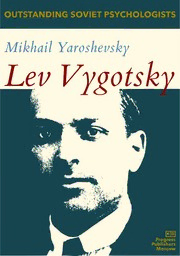
Lev Vygotsky (Outstanding Soviet Psychologists) PDF
Preview Lev Vygotsky (Outstanding Soviet Psychologists)
OUTSTANDING SOVIET PSYCHOLOGISTS Mikhail Yaroshevsky Lev Vygotsky Progress Publishers Moscow M I K H A I L YA R O S H E V S K Y L E V V Y G O T S K Y TranslatedfromtheRussianbySergeiSyrovatkin. FirstPublishedbyProgressPublishers,Moscowin1989. ThiselectronicversiontypesetinLATEXbyDamitrMazanov Releasedonthewebin2021by . http://mirtitles.org Thesourcefilesforthisbookareavailableat . https://gitlab.com/mirtitles/vygotsky.git Contents Introduction 7 Family and School 25 University Years. The Riddle of Hamlet 29 Teacher in Gomel 41 From Reflexology To Psychology 49 The Abnormal Child In The World Of Culture 67 Art: A Social Technique For The Emotions 91 The Crisis In Psychology And Its Historical Meaning 111 In Search Of Traps For The Psyche 133 Psychology In Terms Of Drama 141 The Discovery Of The Mechanism Of The Higher Forms Of Behaviour 155 The Path To Concept 171 6 mikhail yaroshevsky The Fate Of The Word In The Life Of Individual Thought 187 Integral Schema Of The Structure Of Consciousness 199 Introduction ItcanhardlybedoubtedinthesedaysthattheRussianscholarLev SemyonovichVygotsky(1896-1934)isastarofthefirstmagnitude intheskyofmodernpsychology,astarwhichshineseverbrighter withthepassageoftime.Thisishomeoutbytheopinionsofmany Westernscientists.TheoutstandingAmericanpsychologistJerome Bruner,socharyofpraise,saidin1977:“Everypsychologistwhohas studiedcognitiveprocessesinthepast25years,shouldacknowledge thegreatimpactmadeonhimbytheworksofLevVygotsky.”In thefollowingyear,anotherwell-knownAmericanscholarStephen Toulmin,inanarticleaboutVygotskywrittenforTheNewYorkReview ofBooks,referredtohimas“theMozartofpsychology”.Intheview ofDr.BernsteinofLondonUniversity,continuationofVygotsky’s work,which“openedthewaytoaunificationofthebiologicaland socialstudies”,may“haveatleastasgreatasignificanceforscienceas thedecipheringofthegeneticcode”. Inhisnativecountry,Vygotskygainedfameasanoutstanding researcherinpsychologyasearlyasthe1920s.IntheWest,though, hewasverylittleknownthen.Theonlytimehewentabroadwasin 1926.Onthatoccasionhereadapaperontheprinciplesofteaching deaf-and-mutechildreninRussiaataninternationalconferencein London.In1929,hisreport,preparedtogetherwithAlexanderLuria, anotherprominentSovietpsychologistandafollowerofVygotsky, wasreadattheIXInternationalPsychologicalCongressintheUSA.Their paperdealtwithaveryspecialistsubject–theso-calledegocentric childspeech,i.e.,achild’sutterancesthatarenotaddressedtoalistener. Underlyingthediscussionofthisstrangephenomenon,observed 8 lev vygotsky insmallchildrenanddisappearingbythebeginningoftheschool age,wasaninnovativetheoryofthemechanismoftheworkofthe humanmind,atheorythatwasdestinedtooccupyaprominentplace inworldpsychology.Wemustmentionacurioushistoricalfactatthis point.Anotherfuturegiantofpsychology,theyoungSwissscholar JeanPiaget,alsospokeonthesamesubjectatthesameInternational CongressofPsychologists.VygotskyandPiagetdiscussedoneandthe samephenomenon,certainidenticalfacts,buttheirexplanationsof thesefactswerequitedifferent,thedivergencereflectingafundamental differenceinphilosophicalorientation.However,neithertheproblem ofegocentricspeechitselfnoritsdifferentinterpretationsattracted theattentionoftheCongress.MostparticipantswereAmerican psychologists,andtheserecognisedonlyonetrendasstrictlyscientific. Thattrendwasbehaviourism,whichinsistedonthestudyofexternal behaviour,thatis,oftheorganism’sreactionstoexternalstimuli, rejectinganyinterestinpsychicalphenomena,intheinnermental processes. ThebehaviouristsregardedIvanPavlovasthefatherofthattype ofpsychology,sothatthemaineventoftheCongresswasthespeech bythegreatoldman,eighty-year-oldPavlovwhohadtravelledacross theoceantobereceivedwiththunderousapplause.Pavlovwasseenas theprincipalfigureinRussianSovietpsychology.Severaldecadeslater itwouldbeVygotskywhowouldbeperceivedassuchafigure.This radicalshiftintheassessmentoftheideologicalforcesdeterminingthe imageofpsychologyintheSovietUnion,reflectedanevolutioninthe viewsonthepsycheinworldscience.Behaviourism,triumphantin the1920s,laterlostitsformerpositionsinAmericanpsychology,giving waytoatrendknownascognitivism.Theso-calledcognitiveparadigm tookshape.Thecognitiveprocesseswhichserveastoolsofacquiring informationaboutrealitygraduallybecamethefocusofpsychological study.Interestinman’sinformation-relatedactivitysharplyincreased withtheadventofthecomputerera. Theachievementsofthescientificandtechnologicalrevolutionled totheappearanceofnewmachinescapableofreceivingandprocessing information.Suchtermsas“memory”,“intellect”andothersbecame partoftechnologicalthinking–aprocesswhichreflectedtheneedfor thedescriptionofcomputers’specificproperties.Behaviourismhad introduction 9 refusedtostudythesepropertiesasspecificinnerprocessesinhuman activity.Nowinformationdevicesprovedtobecapableofperforming certainactssimilartothatactivity.Itwasthisfactthatconditionedthe shifttowardscognitivismintheentireareaofpsychologicalknowledge. Alongwiththisshift,therecameachangeinthenotionsofthe natureofthebasicstockofthatknowledge.Itwasatthatpointintime thatVygotsky’swork,whichcentredonexplainingthedynamicsof psychicalprocesses,begantoattractconsiderableattention.Thework ofWesternresearchersinthepsychologyofknowledge,including Americanones,wasandstillisinfluencedbyVygotsky’sstudies,as indicatedbyBruner’sevaluationofVygotsky’simpactonthemquot- edabove.Itcanthusbesaidthat,justastheworkofPavlovgavea powerfulimpetustothedevelopmentofworldpsychologyinthefirst quarterofthe20thcentury,sodidtheworkofVygotskygivesuchan impetustoitsdevelopmentinthethirdquarterofthiscentury.This factwasobviouslyconditionedbytheobjectivesituationinscience,by theneedfortheideas,approachesandparadigmsengenderedinRussia. Thereexistsanobjectivelogicofthedevelopmentofscientific knowledgethatisindependentofthenationalsubstratum.Thework ofbothRussianscientistsreflectedtheneedsofthisobjectivelogic andtheimminentshiftsinpsychologyleadingintothefuture.That waswhytheydidtheirpioneeringresearchinareasthatdetermined thecharacterofworldpsychologyatdifferentepochs:Pavlov,inthe objectivestudyofbehaviour,andVygotsky,intheobjectivestudy ofthepsychologyofcognition.Bothopenednewchaptersinthe chronicleofworldpsychologicalthought.Whenwestatethatthe evolutionofscientificideasissubjecttoobjectivelawsowingtothe internationalcharacterofscience,itshouldbeborneinmindthat thecourseofthisevolutionisdeterminedbythespecificfeatures ofthesocio-culturalcontextinwhichknowledgeisbornandlater transformed. PavlovandVygotskyweretrailblazersandleadersofprevailing trends,butthesourcesoftheirinnovationsdidnotlieintheirpersonal geniusonly–firstandforemost,thesesourcesmustbesoughtforin thesocialandideologicalatmosphereinwhichtheyworked;onlyby absorbingthatatmospheretheywereabletorealisetheirpersonality potential.Itiseasytodemonstratethisviewbyconsideringtheturning 10 lev vygotsky pointsintheirthinkingthatledthemtonewapproachesandproblem areas.Pavlovdiscoveredconditionedreflexesaftergainingworldfame byhisworksonthephysiologyofdigestion.Itwastheseworksthat broughthimtheNobelPrize.Hewaspastfiftywhen,aftermuch painfulsoul-searching,helefttheareaofresearchwhichhadmadehis namefamousandbeganthestudyofmechanismsregulatingbehaviour. Independentlyfromhim,researchersinvariouscountriesofthe worldturnedtothestudyofthesephenomenaatapproximately thesametime.AfterreadingAmericanworks,Pavlovhimselflater wrotethat“thehonourofbeingthefirsttohavesetoutalongthe newpathbelongstoThorndike,whoanticipatedourexperimentsby sometwoorthreeyears”.1 EdwardThorndikeanticipatedPavlov’s 1.I.P.Pavlov,Polnoye experimentsinteachinganimalsnewformsofbehaviour,butPavlov, sobraniyesochinenii(Complete Works,InRussian),2nded., asweshalllatersee,movedinadirectiondifferentfromtheonechosen vol.3,1(Moscow-Leningrad, byAmericanpsychologists.Thesourcesofthedifferenceslayinthe 1951),p.15. factthateachoftheresearchersreliedontraditionscreatedbyoriginal cultures–RussianandAmerican.Thatwaswhataffectedthecharacter ofscientificquestsdetermined,werepeat,bytheobjectivelogicofthe movementofknowledge.Itwasthislogicthatfundamentallychanged thedirectionofthefamousphysiologist’ssearch. ThesituationwasmuchthesamewhenVygotsky,whoatfirst specialisedinaestheticsandliterarycriticism,begantostudypsycho- logicalproblems.Itisdifficulttodivinewhattheachievementsofthis extremelytalentedthinkerinthisareawouldbeifhehadnotbecome, soonafterthevictoryoftheOctoberRevolutioninRussia,ateacherat aSovietschool,ifhehadnotabsorbedthenewideologyofMarxism, itsphilosophicaltheory,whichbecameanestablishedfeatureofthe socialconsciousness,Itwasthistheorythatdirectedhisthinkingto wardsworkingoutthefundamentalproblemsofpsychologyfrom anewangle.Hisprincipalachievementswere,aswehavepointed out,severaldiscoveriesinthepsychologyofcognition.Hewasnot alonelyfigureforgingaheadinthisarea.Theattentionofanumber ofWestEuropeanresearcherswasalsofocusedontheseproblems, especiallyontherelationsbetweenthoughtandspeech.Letusrecall,in particular,egocentricspeech,whichwasfirstaccordedthestatusofa psychologicallyinterestingphenomenonaftertheworksofJeanPiaget. JustasThorndikewasaforerunnerofPavlov,Piagetwasinthis
